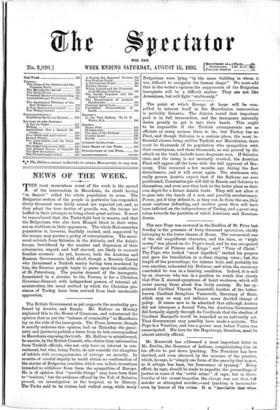Mr. Roosevelt has addressed a most important letter to Mr.
Durbin, the Governor of Indiana, congratulating him on his efforts to put down lynching. The President has been shocked, and even alarmed, by the increase of the practice, which, he says, is "simply one form of the anarchy that is now, as it always bas been, the forerunner of tyranny." Every effort, he says, should be made to expedite the proceedings of justice in cases of the "awful crime" of rape; but in three- fourths of the recent tragedies the charge was not that, but murder or attempted murder,—and lynching is inexcusable even by horror of the crime. It is " inevitable that when vengeance is taken by the mob" it should frequently light on innocent people; and even when they are guilty " the wrong done to the community itself is almost as great." Especially is this true "when lynching is accompanied by torture," "the mere fact of having seen which implies degradation." The spectator "never can again be the same man." The letter will produce a profound effect upon opinion even in the wilder States ; but as we have explained elsewhere, the direct action of the central Government is barred by the principle of " State Rights " which is embedded in the American Consti- tution. It is the State Governments which must act, and many of them will be reluctant ; but they all can if they please invest their Courts for the punishment of rape with the power of swift action possessed by a Court-Martial.







































